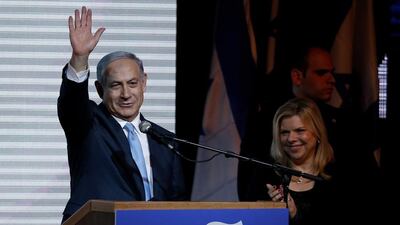Benjamin Netanyahu’s pre-election declaration that there would be no Palestinian state under his government was hardly a bombshell. Though he has on occasion declared his support for a Palestinian state, it never felt like a genuine commitment. His disavowal of Palestinian statehood has merely torn away a mask that had become transparent.
In diplomatic circles, however, Mr Netanyahu’s coming clean is a game-changer. The prospect of a Palestinian state, however distant, has been the corner stone of all Middle East peace efforts. Without some kind of agreed process, diplomats fear that Israel and Palestine are heading for a new explosion.
The peace process is what justifies the US preserving the status quo. When Washington vetoed the Palestinian Authority request for statehood at the UN Security Council in December, the justification was that it was “more likely to curtail useful negotiations than to bring them to a successful conclusion”. Without any prospect of “useful negotiations”, it is hard to see how the US could to that again.
Likewise ,it would be hard to justify the US and European Union continuing to fund the Palestinian Authority, a government in the West Bank whose popularity, such as it is, depends solely on its ability to pay 160,000 public sector salaries. If Israel wants the land, why should it not have to pay those salaries? And if there is no prospect of gaining their own state, why should Palestinians continue with the security cooperation that helps Israelis sleep at night?
There is already a crisis brewing over Israel’s refusal to hand over tax receipts it collects on behalf of the Palestinian Authority. This is in response to the PA’s application to join the International Criminal Court. After it joins the court formally on April 1, it will be able to press war crimes charges against Israel over the Gaza war.
At this point, it is time for a reality check. Any observer of the situation would have concluded that the prospect of a state that would meet even the minimal Palestinian demands has been out of the question for years.
Israel’s settlement building has proceeded at pace during the years of the “peace process” since 1993. So much so that the land available for a state will amount to no more than a patchwork of cantons. Given the drift of Israeli politics towards the right and the current instability in the Arab world, no conceivable Israeli government could order the expulsion of the Jewish settlers. So why all the fuss over a vanishing mirage?
That is the view of advocates of a bi-national one-state solution who welcome the Netanyahu triumph as proof that the peace negotiations have been no more than dust in the eyes of the Palestinians. Ilan Pappe, the Israeli historian and activist who has lived in Britain since 2008 following death threats, wrote: “A liberal Zionist government would have blinded the world for a bit longer. So all in all, the true face of the settler colonialist state of Israel has been once more exposed. Now will the world react finally?”
This question has put the EU, Israel’s biggest trading partner, on the spot. It has some mini-sanctions up its sleeve: an EU-wide requirement for goods produced in Israeli settlements to be labelled as coming from occupied territory rather than “made in Israel”, sanctions against European companies that work in East Jerusalem and the settlements, and a boycott of Israeli politicians who advocate annexing Palestinian land.
No one believes that these measures would change the mind of a newly elected Israeli prime minister. EU leverage is so constrained by differences among the 28 member states that the view in Brussels is that only action coordinated with Washington would make a difference.
That leaves civil society action in the form of the BDS campaign to exert economic pressure on Israel through calls for boycotts, disinvestment and sanctions. Undoubtedly this campaign will be spurred by the result of the Israel election. But this is a slow-burn form of pressure, especially when Israel is so closely connected to the US economy in high tech and defence.
So far the EU response has been to duck questions by stating that it is waiting for the formation of the next Netanyahu government. What is abundantly clear is that in diplomatic circles the end of the “peace process” is something that is too scary to contemplate.
There is a hope in Brussels that Mr Netanyahu can be walked back from a statement made in the heat of the campaign. There is a precedent. In 1996, Mr Netanyahu was elected on a promise not to withdraw Israeli troops from the West Bank city of Hebron, a focus of radical religious Jewish settlement.
In 1997, he shook hands with Yasser Arafat, the then Palestinian leader, on an agreement under which most of Hebron was handed to Palestinian control, while Israeli soldiers remained to guard the settlers. The “peace process” was kept on track, at the cost of creating a source of resentment which poisoned the atmosphere.
It is not unthinkable that Mr Netanyahu could reverse himself as he did over Hebron. But only a fool would believe that a new round of talks would be a fast track to a Palestinian state. Business as usual has run its course even though it may serve a short-term diplomatic goal.
The real issue is not talks about talks but to convince Mr Netanyahu that if there is no Palestinian state, then the logical alternative is one state for Jews and Arabs, which for demographic reasons would mean the end of the Jewish state that he claims to defend. The collapse of the Palestinian Authority, which the diplomatic community wants to avert, would be bloody but it would have one advantage: it would bring into stark relief the long-term consequences for Israeli security of Mr Netanyahu’s politicking.
Alan Philps is a commentator on global affairs
On Twitter @aphilps

